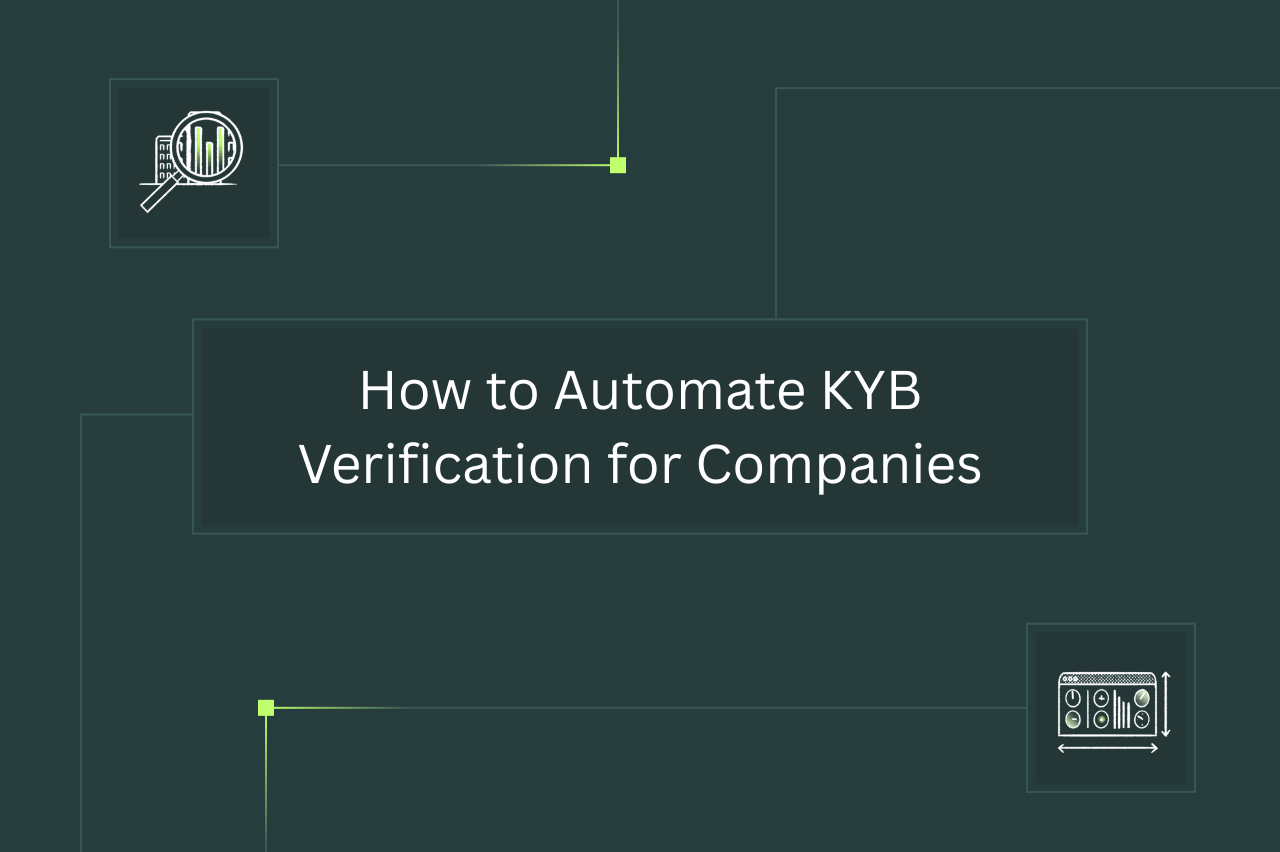In brief:
- Identity verification APIs automates entity verification so you can easily check that the businesses you’re onboarding are who they claim to be
- Early risk signals help you auto-approve low-risk entities, streamlining your onboarding process and keeping your funnel running smooth
- When used properly, these tools help teams provide enhanced security, streamline workflows, and meet regulatory requirements
Our world is fast-paced. To keep up, businesses rely on expedient onboarding that gets customers up-and-running without delay. But these businesses also need to keep their platforms safe from bad actors by keeping them from entering the ecosystem in the first place.
This can be a tall order, as there are many regulatory requirements to meet, as well as their own business risks to assess. When done manually, this can take an immense amount of time and effort. Fortunately, identity verification APIs can automate much of this process for you, freeing up valuable time for your team to dedicate elsewhere.
To help you determine if an identity verification API is right for your team, we’ll cover the following:
- What is an identity verification API?
- How does an identity verification API work?
- Common uses cases for an identity verification API
- Exactly how an identify verification API fits into your KYB process
- 5 benefits of using an identity verification API over manual processes
- How identity verification API pricing works
- 5 top identity verification API services for businesses onboarding
Before we dive into common use cases and the core benefits, let’s cover what an ID verification API is and how they work.
Teams can then use this information to make data-driven onboarding decisions that minimize risk and cut undue costs. More than that, they can set up automated approval processes that enable them to approve low-risk entities quickly while escalating high-risk cases for further review and compliance screening.
This saves Know Your Business (KYB) teams time from manually verifying businesses by looking up information from each individual state registry. Instead, you can simply input the business name and address, receiving details about the business' registration status, business documents, and other risk signals that help you assess a business during onboarding.
An identity verification API searches a database, cross-referencing official business documents and records to verify whether the business searched is a match. It often provides a confidence score and other risk-related details that help companies determine the risk of working with this business.
To do this, most identity verification APIs use a standard workflow:
- Data collection: The API collects the details it needs to run a verification. This starts with just a business name and, if you have it, an address.
- API request: Using an API key or token, an authentication request is sent and the data is transmitted securely to the identity verification API endpoint.
- Data verification: The data is cross-checked against official, authoritative databases and watchlists to ensure authenticity.
- Response: The API returns verification results, provides a confidence score, and potentially takes action based on predefined criteria.
Businesses are then approved and onboarded, or referred for further screening. Auto-approving low-risk prospects save your team significant time and resources, while still ensuring that you’re adequately screening for risk. This way, you can escalate higher risk cases for further review while instantly onboarding low-risk customers and clients so you can immediately start business.
Throughout this process, identity verification APIs prioritize secure communication protocols, keeping private data secure. They also log every action taken so you have adequate records for audits and compliance requirements.
{{gated-content-block="/events/webinar-bevbreak-synthetic-id-jan-2025"}}
Fintechs
Fintechs have made a name for themselves by offering fast, seamless digital experiences that are convenient and effortless for their customers. Their customers are looking for a quick, painless process, even when onboarding.
To get new customers up and running quickly, Fintechs rely heavily on using early indicators that enable them to pull out low risk customers and speed up their approvals. While they do have certain regulatory requirements they have to meet within the financial industry, early indicators can help Fintechs offer clients more advanced financial products and extend them greater capital earlier - without taking on undue risk.
Traditional banks
Traditional banks are looking to adopt the seamless, digital-first experience that Fintechs provide, while still offering customers an in-store experience with a personal touch. With some of the highest regulatory standards of any industry, financial institutions like traditional banks need to meet applicable KYC and AML regulations to help prevent fraud and other financial crimes.
To do this effectively, traditional banks need to support a variety of onboarding journeys — far more than any Fintech has to. Each journey needs to be convenient and smooth, while still ensuring all regulatory requirements are met. The right identity verification API helps banks check for early indicators that let them streamline low-risk entities for faster onboarding.
Lenders
Lenders rely on being able to extend new clients capital quickly. But to feel confident lending to new customers, you need to trust them.
An identity verification API allows lenders to quickly assess client risk, and determine not only whether to onboard the customer at all — but also determine their risk level, helping you assess how much capital you can safely extend from the moment they become a customer. Obviously, you’ll be able to scale this amount up as time passes, but being able to give customers that capital they want from day one will help you win more customers, all without absorbing additional risk.
Marketplaces
To have a thriving business, marketplaces need a community of active buyers and sellers. To build a solid reputation, it’s critical to maintain marketplace integrity, keeping all users — buyers and sellers alike — safe from fraud and other financial crimes.
An identity verification API helps teams onboard merchants and customers quickly so they can get on your marketplace and start shopping and listing items. This minimizes onboarding delays, keeps your marketplace active, and ensures new users get immediate access.
Payments Service Providers (PSPs)
Payment Service Providers (PSP) need to make sure every translation they process is legitimate. This starts with ensuring that every merchant and business they onboard is who they claim to be, is capable of managing secure transactions, and is compliant with all relevant regulations — especially KYC and AML requirements.
An identity verification API conducts automated business authentication, providing early indicators that allow you to either approve a new customer or escalate them for additional screening. This way, companies can get right to business and make transactions, without absorbing undue risk.
An identity verification API is best used at the beginning of the process as an early indicator. The automated KYB check can either auto-approve low-risk entities to be onboarded immediately or escalate high-risk entities to further screening. This way, more rigorous, manual reviews are reserved for extreme cases — saving your team significant time and resources.
Below, we show you where we recommend using an identity verification API in a KYB onboarding workflow:
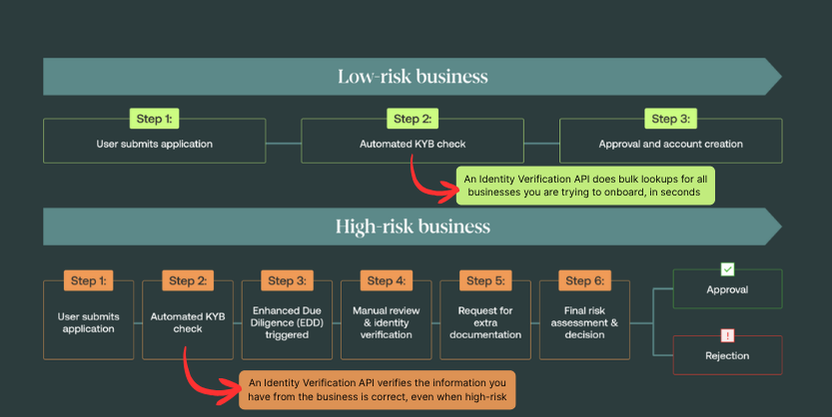
By integrating the identity verification API early in the process, you get the most value from it. Filtering low-risk entities out of your more rigorous approval process drastically cuts review time, saving your team time and resources that can be dedicated to high-risk cases. This way, you only have to conduct Enhanced Due Diligence (EDD), Politically Exposed Persons (PEP) screening, and watchlist screening on serious cases.
This way, you can get low-risk entities approved quickly so they can use your platform — without any undue delays. This allows you to onboard customers fast and keep them satisfied, while still maintaining safety with full-scale reviews of high-risk entities. For enterprise-level clients, this can significantly reduce the amount of manual reviews you're conducting, as you’ll only be reviewing the most pertinent cases.
An identity verification API automates many business validation processes, replacing manual tasks. This frees up staff and resources that can be diverted elsewhere. Overall, this helps teams reduce their workload and speed up onboarding.
Below, we look at some of the key benefits of using an identity verification API in place of manual processes.
1. Provide enhanced security and fraud protection
At its core, identity verification APIs help teams conduct faster, more effective business verification. This helps companies ensure the customers they onboard are legitimate businesses in good standing. By screening who they onboard, companies are able to keep their platform safe and secure from fraud and other financial crimes.
2. Expedite onboarding for low-risk entities
When used properly, an identity verification IP can speed up onboarding for low-risk entities. These tools provide early indicators that let you assess risk early on, helping you funnel prospects into the right onboarding process.
Low-risk entities can be automatically approved so they can get up and running quickly, while high-risk entities can be escalated to advanced screening processes. This can range from requesting additional documents, Enhanced Due Diligence (EDD), and more.
Allowing customers to skip these processes can be the difference between a customer completing onboarding or abandoning your service altogether. Early risk signals are critical for getting businesses onboarded quickly and expanding the services they are able to use. The less hurdles they have to go through, the more likely they are to complete onboarding and go on to be a regular customer.
3. Streamline workflows and increase efficiency
An identity verification API operates mostly in the background, automatically screening entities as part of your workflow. It will auto-approve new customers that meet the necessary criteria and escalate cases to additional screening when necessary. This allows you to focus your resources on the cases that need additional screening, drastically increasing operational efficiency.
4. Meet regulatory requirements
Modern customers are looking for a fast, convenient experience. If you can’t offer that, they’ll look elsewhere. The more hoops you make your customers walk through, the more likely they are to abandon onboarding.
Unfortunately, many businesses need to run mandatory compliance checks to meet KYC and AML regulatory requirements. Modern identity verification APIs streamline this process by automating as much as possible. These tools help teams stay compliant and make it easy for them to produce records for auditing purposes.
5. Cut costs and improve ROI
Overall, identity verification APIs help teams with their bottom line — cutting costs and boosting ROI. Most directly, these tools help teams reduce manual processes through automation, saving them time, resources, and money.
Auto-approvals enable teams to focus their manual reviews where they matter most — on their highest risk cases. With automated ID verification operating via the API, your onboarding isn’t bottlenecked in the process. Instead, low-risk entities are onboarded quickly, with no hassle.
By cutting back the manual review time needed, teams can reduce the number of analysts they need on staff. At the same time, more robust fraud protection and prevention systems ensure teams are able to reduce fraud losses.
Identity verification APIs are priced like many other SaaS products, with costs being tied to the number of seats and feature offerings you want to have. Brands traditionally offer tiered pricing plans that scale up in price as more features or seats are added to the plan. Some companies offer barebones plans for small businesses and custom pricing for enterprise-level organizations.
Typically, identity verification APIs are priced using one of the following four models:
- Cost per data input - Companies pay a base fee for each individual lookup. These lookups typically range from $0.01 to $0.99 per lookup, with the price determined by the type of data that’s provided.
- Small business plans - Smaller companies typically don’t need all the bells and whistles. These plans provide companies the basic plan features at a lower cost, sometimes enabling add-ons. These plans are often under $100 a month per seat.
- Scaling / tiered subscriptions - Companies can choose between tiered product offerings that provide more features at a higher price. Typically, these plans charge by seat, and can cost anywhere from $100 to $999 per seat.
- Enterprise / customer pricing - Enterprise companies often need a more tailored approach, with services catered precisely to their unique needs. Enterprise pricing is usually customized to a company’s specific needs, and is often more than $1000 per month.
Individual lookups can be appealing, as you only pay per lookup. However, if you conduct bulk lookups, these costs can add up quickly. Basic plans are often sufficient for startups and small businesses that only need core product offerings to do their job.
However, larger companies want more robust product offerings that suit their specific needs. Tiered pricing models allow this flexibility, with organizations building different bundles that package different service offerings. For large enterprise companies, these pre-built packages may not be enough. Instead, they’ll opt for a uniquely designed plan for them, which often comes at a higher price tag.
{{related-content-block="/blog/manual-identity-verification"}}
Improving onboarding is all about having the right tool for the job. Below, we explore five of the top identity verification APIs on the market so you can streamline your business onboarding and verification.
1. Best for U.S. business onboarding: Middesk
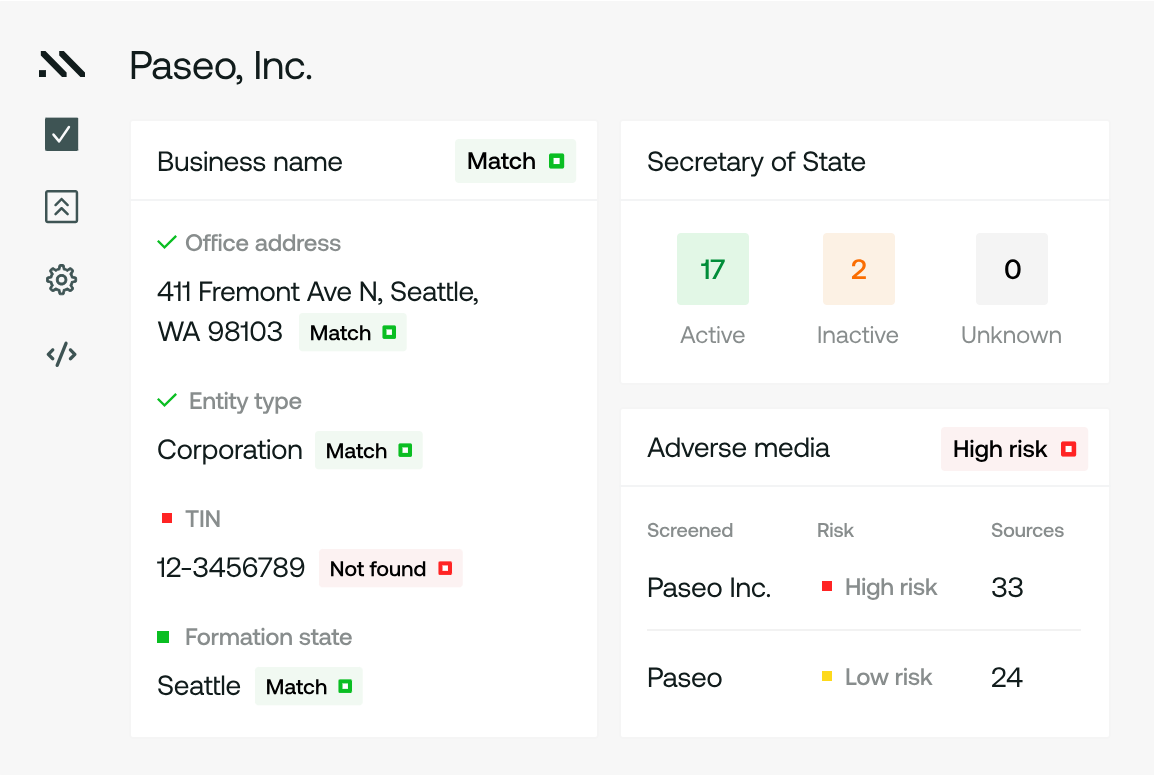
Middesk is an identity verification solution that specializes in validating business customers for KYB compliance. We verify key business identity details and automate watchlist screening so you can onboard customers faster, with absolute confidence. With advanced business details, we can also help you assess legal and financial risk so you can meet CIP, CDD, and EDD requirements.
We’re designed to keep US companies in compliance with all applicable KYC and AML requirements, while still streamlining onboarding for your customers. We don’t just stop there though, we provide a variety of risk signals that help you determine if conducting with a business carries any risk.
2. Best for global verification: Persona

Persona is a scalable identity solution that helps teams across a variety of industries, including BFSI, ecommerce, payments, healthcare, and even higher education. They specialize in compliance, trust and safety, and fraud prevention, helping teams onboard — and manage — their customers safely and securely. Their global expansion product helps teams conduct international verification, while still honing in on building local trust.
3. Best for fraud prevention: Socure
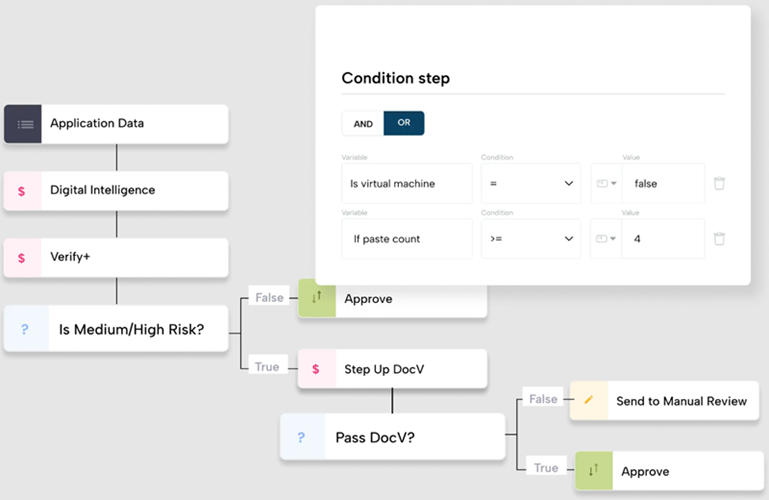
Socure is a leading fraud prevention and identity verification solution. Their RiskOS system prevents and protects against fraud, with both consumer and business onboarding capabilities. While they do serve ecommerce and other industries, they specialize in BFSI, with features designed for Fintechs, traditional banks, and crypto exchanges.
Socure’s AI-powered decision-making helps teams onboard consumers quickly and confidently.
4. Best for credit and bank deposits: Mantl
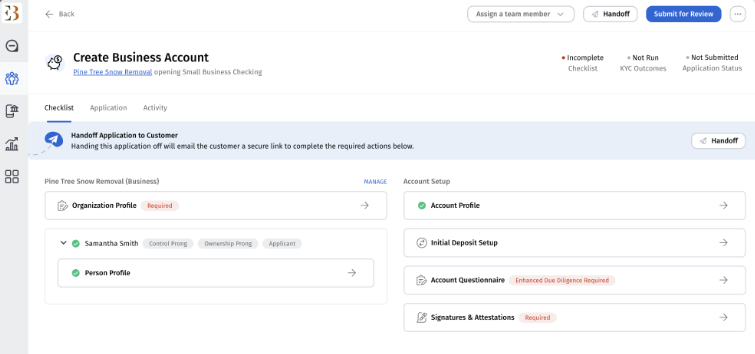
Mantl specializes in deposit and loan origination for banks and credit unions. They make it easy for digital banks to launch their brand and empower them to accelerate deposits. At the same time, they make it easy for brands to operate an omnichannel marketing strategy that pulls prospects in from online, in-branch, and call centers — all from one platform.
5. Best for data storage: Footprint

Footprint’s ‘identity infrastructure’ is designed to grow your business by simplifying complex onboarding and automating KYC and KYB processing. With built-in fraud detection, it helps prevent and protect against fraud and other financial crimes.
With Footprint’s Vaultling feature, teams can securely store identity data, payment card data, and custom key-value data safely. It also keeps clean audit trails so you have all the records you need if that ever comes up.
Middesk Verify empowers teams to automate business identity verification so they can convert customers faster — with absolute confidence. Don’t just validate that businesses are who they claim to be, get full details on their risk level so you can make the right decision about onboarding — or rejecting — a new customer.
Get early risk signals that let you auto-approve more cases and don’t have to hold your customers up during onboarding. Get credit and lien details as well, so you fully understand their credit history.
Check out our on-demand product demo of Middesk Verify right now to see exactly how you can automate your identity verification process:
{{gated-content-block="/events/productdemo-verify-june-2025"}}






